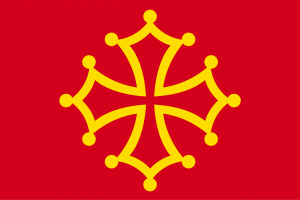Language/Occitan-post-1500/Grammar/Negation
Hi Occitan (post 1500) learners! 😊
In this lesson, we will focus on the Negation in Occitan (post 1500) Grammar. Understanding how to use negation is a crucial part of mastering any language, and Occitan (post 1500) is no exception. We'll go through the basic rules of negation, as well as some common expressions and examples. By the end of this lesson, you will be able to use negation correctly in your Occitan (post 1500) sentences. Don't forget to take notes and practice! Let's get started.
Don't hesitate to look into these other pages after completing this lesson: Pronouns, Conjugation, Prepositions & Verbs in Occitan.
Introduction to Negation[edit | edit source]
In Occitan (post 1500), negation is used to indicate the opposite or the negation of something. In order to create a negation in Occitan (post 1500), we use the word "ne" (or "non" in some specific cases) in front of the verb, and another word afterwards to indicate the negation. For example:
- "Je ne parle pas Occitan (post 1500)." (I do not speak Occitan (post 1500).)
- "Il ne mange jamais de légumes." (He never eats vegetables.)
As you can see, "ne" is used before the verb "parle" and "mange," and "pas" and "jamais" are used afterwards to indicate the negation.
Negation Words[edit | edit source]
In Occitan (post 1500), there are several words we can use to indicate negation. Here are some of the most common ones:
- Ne...pas - not
- Ne...jamais - never
- Ne...plus - no longer
- Ne...rien - nothing
- Ne...personne - no one
Let's see some examples:
| Occitan (post 1500) | Pronunciation | English |
|---|---|---|
| Je ne parle pas Occitan (post 1500). | /ʒə nə paʁl pa òkᵗiˈtɑn/ | I do not speak Occitan (post 1500). |
| Elle ne mange jamais de légumes. | /ɛl nə mɑ̃ʒ ʒamɛ də leˈɡym/ | She never eats vegetables. |
| Il ne travaille plus ici. | /il nə tʁavaj pu ziˈsi/ | He no longer works here. |
| Je ne vois rien. | /ʒə nə vwa ʁjɛ̃/ | I see nothing. |
| Personne ne sait où il est. | /pɛʁsɔn nə sɛ pa u il ɛ/ | No one knows where he is. |
Double Negation[edit | edit source]
In Occitan (post 1500), double negation is commonly used to express affirmation. This may sound strange, but it's a grammatical rule you'll want to remember. Double negation is created by using the word "ne" followed by another negation word. For example:
- "Je ne vois rien." (I see nothing.)
- "Je ne vois personne." (I do not see anyone.)
In both examples, double negation is used to express the idea that the speaker really means "I do not see anything" or "I do not see anyone."
Word Order[edit | edit source]
In Occitan (post 1500), it is important to remember that the word order changes when using negation. The typical word order in Occitan (post 1500) is subject-verb-object. However, when using negation, the word order changes to subject-ne-verb-object. Here's an example:
- "Je parle Français." (I speak French.)
- "Je ne parle pas Français." (I do not speak French.)
In the first example, the word order is subject-verb-object. In the second example, the word order is subject-ne-verb-object, with "ne" and "pas" indicating the negation in between the subject and the verb.
Common Negation Expressions[edit | edit source]
Let's take a look at some useful expressions that use negation in Occitan (post 1500):
- "Je ne comprends pas" - I don't understand
- "Il n'y a personne" - There is nobody
- "Je ne sais pas" - I don't know
- "Elle n'est jamais venue" - She never came
- "Il n'a rien mangé" - He ate nothing
- "Je ne veux plus de café" - I don't want any more coffee
- "Je ne peux rien faire" - I can't do anything
You can use these expressions in a variety of situations to express negation.
Dialogue[edit | edit source]
Here's an example dialogue using negation in Occitan (post 1500):
- Person 1: "Tu as des frères ou des soeurs?" (Do you have any siblings?)
- Person 2: "Je n'ai ni frères ni soeurs." (I have neither brothers nor sisters.)
- Person 1: "Tu parles anglais?" (Do you speak English?)
- Person 2: "Je ne parle pas anglais." (I do not speak English.)
Try to make your own dialogue using negation.
Practice Exercises[edit | edit source]
To practice negation, try the following exercises:
- Create a sentence using "ne...pas" with a verb of your choice.
- Write five sentences using different negation expressions.
- Translate the following sentences into Occitan (post 1500):
1. I don't want to go. 2. We don't have any money. 3. She never watches TV. 4. They don't understand French. 5. He didn't eat anything.
Conclusion[edit | edit source]
Using negation properly is a key element in Occitan (post 1500) grammar. Remember to use "ne" before the verb and another negation word afterwards to create negation. Don't forget to pay attention to the word order and to use double negation for affirmation. To improve your Occitan (post 1500) Grammar, you can also use the Polyglot Club website. Find native speakers and ask them any questions! Don't forget to practice and have fun learning Occitan (post 1500)! 😊
➡ If you have any questions, please ask them in the comments section below.
➡ Feel free to edit this wiki page if you think it can be improved. 😎
Sources[edit | edit source]
With this lesson finished, you may want to explore these additional pages: Definite Articles in Occitan, Say Hello and Greetings in Occitan (post 1500), Possessive Case in Occitan & Past Pasticiple in Occitan.

